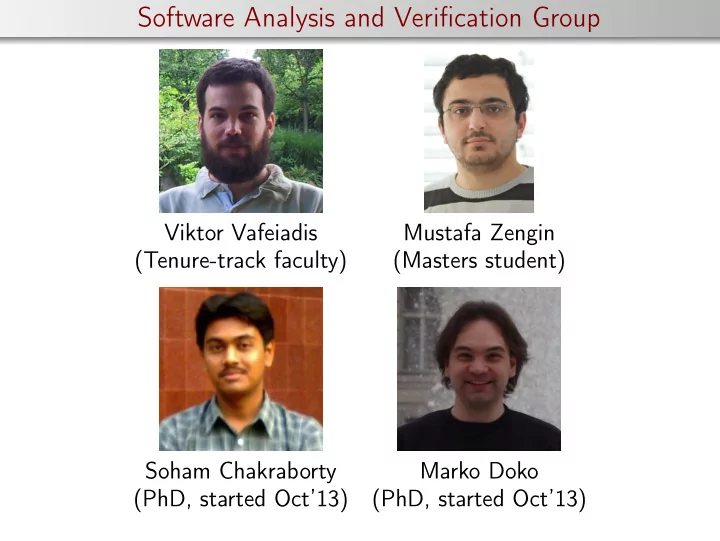

Software Analysis and Verification Group Viktor Vafeiadis Mustafa Zengin (Tenure-track faculty) (Masters student) Soham Chakraborty Marko Doko (PhD, started Oct’13) (PhD, started Oct’13)
Research direction Verify full functional correctness: Come up with the specification Prove the code matches the specification Develop “the right tools” for doing so: Program logics (e.g., separation logic) Interactive theorem provers (e.g., Coq) Main application domains: Concurrent libraries ❀ spec: linearizability Compilers ❀ spec: ∀ prg . � compile ( prg ) � = � prg � Viktor Vafeiadis Software Analysis and Verification Group 2/8
Research output Concurrency Relaxed separation logic (OOPSLA’13) Aspect-oriented linearizability [IST] (CONCUR’13) Fault-tolerant parallelism (TASE’13,poster) Compilers CompCertTSO [Cantab,INRIA] (SAS’11,JACM) Parametric bisimulations [DD] (POPL’12,poster) Interactive theorem proving Adjustable references : representing state (ITP’13) Mtac : typed language for tactics [DD] (ICFP’13,poster) Paco : parametrized coinduction [DD] (POPL’12) Viktor Vafeiadis Software Analysis and Verification Group 3/8
The C11 memory model Two types of locations: ordinary and atomic Races on ordinary accesses ❀ error A spectrum of atomic accesses: Relaxed ❀ no fence Release writes ❀ no fence (x86); lwsync (Power) Acquire reads ❀ no fence (x86); isync (Power) Seq. consistent ❀ full memory fence Goal: Explain acquire/release accesses. Viktor Vafeiadis Software Analysis and Verification Group 4/8
Relaxed separation logic You must own a non-atomic location to access it: { ℓ �→ v } [ ℓ ] na := v ′ { ℓ �→ v ′ } { ℓ �→ v } x := [ ℓ ] na { ℓ �→ v ∧ x = v } Atomic allocation ❀ pick location invariant Q { true } x := alloc () { Rel ( x , Q ) ∗ Acq ( x , Q ) } Release write ❀ give away ownership {Q ( v ) ∗ Rel ( ℓ, Q ) } [ ℓ ] rel := v { true } Acquire read ❀ gain ownership { Acq ( ℓ, Q ) } x := [ ℓ ] acq {Q ( x ) } Viktor Vafeiadis Software Analysis and Verification Group 5/8
� � � Technical challenges No operational semantics = ⇒ Use the axiomatic semantics sb � sb � W rel ( x , 1 ) sb � W na ( x , 0 ) W na ( a , 7 ) rf rf asw sb � R na ( a , 7 ) sb � R acq ( x , 1 ) No (global) notions of state and time = ⇒ Define a logical local notion of state = ⇒ Annotate happens-before edges with logical state { P } C { Q } Soundness proof in Coq Viktor Vafeiadis Software Analysis and Verification Group 6/8
Extensions Take more advanced program logics (rely-guarantee, RGSep, deny-guarantee, . . . ) and adapt them to C11 concurrency Handle more advanced C11 constructs: memory fences & consume atomics Build a tool & verify real programs Viktor Vafeiadis Software Analysis and Verification Group 7/8
Research output Concurrency Relaxed separation logic (OOPSLA’13) Aspect-oriented linearizability [IST] (CONCUR’13) Fault-tolerant parallelism (TASE’13,poster) Compilers CompCertTSO [Cantab,INRIA] (SAS’11,JACM) Parametric bisimulations [DD] (POPL’12,poster) Interactive theorem proving Adjustable references : representing state (ITP’13) Mtac : typed language for tactics [DD] (ICFP’13,poster) Paco : parametrized coinduction [DD] (POPL’12) Viktor Vafeiadis Software Analysis and Verification Group 8/8
Recommend
More recommend